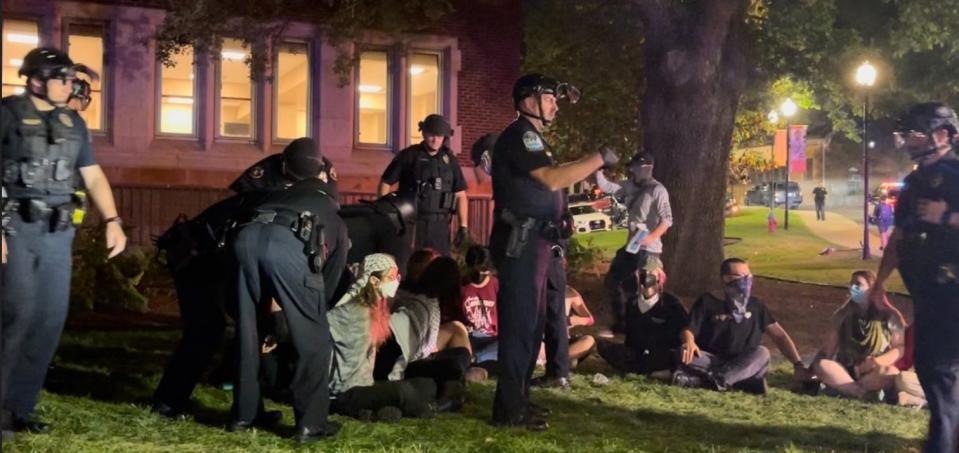Are protests over Israel a proud tradition of student activism? Not so much this time
One often hears remarks from some leaders in higher education and the media that “there’s a proud tradition of activism” among college students. Many seem to have forgotten that the proud tradition is about the outcome sought as well as the method used. What we’ve come to call activism is but one approach to effect positive change. It does not bestow instant righteousness.
Today’s practitioners are coming up short. Many involved are certainly motivated by a sense of justice. That sense of justice appears woefully uninformed or, worse, informed by hate masquerading as virtue. Unfortunately, they’re regularly joined by a motley collection of nonstudent anarchists who regularly emerge for the occasion.
Israeli response to Hamas spurred protests
The genesis of this year’s protest movement was the Israeli response to Hamas’ Oct. 7 mass murders, torture, rapes and hostage-taking of civilians. Yes, many are legitimately upset with the brutal Israeli response that has displaced and killed many thousands of innocents.

The first outbreaks of campus protests were framed around “Cease-fire now.” But at Columbia, NYU, UCLA and and other institutions, that quickly turned to “Palestine will be free,” often followed by “We are Hamas,” “Intifada” and “From the river to the sea,” the overt call for the destruction of Israel.
Oct. 7 has been summarily dismissed. In the memorable words of one Columbia student, “It’s a false narrative.” Translation: What occurred doesn’t matter, or worse, is excused as “resistance.” The grand scheme of things is cast in narratives. The centuries-long history of the Middle East is reduced to the simplistic storyline of evil settler colonists and those they oppress. The complex story of Israel and the Palestinians deserves better treatment.
Anti-Americanism has increased during protests
There are other unsettling elements of the Gaza protests. There’s a growing current of anti-Americanism, with shouts of “Death to America” and replacing American flags with Palestinian ones. Using blatantly antisemitic language and hiding behind masks to conceal one’s identity reflects another not-so-proud history of robed, masked activists fueled by racial and religious hatred.
Higher-education leaders must maintain the academy as neutral on issues and take all measures to protect and encourage the free exchange of ideas. This includes passionate advocacy for unpopular positions. University administrators are also obligated to prevent anyone from taking control of property designated for public access. There’s nothing about free speech that validates occupying or vandalizing buildings.
Time, place and manner restrictions, thoughtfully used, protect and enhance free speech. Campus leaders are absolutely obligated to protect all students’ ability to pursue their studies free from harassment.
There is ample opportunity for expressing opposition to a law or policy without trespassing or seizing buildings, or shutting down traffic on public streets. Nonetheless, university and public officials have been wise in attempting to diffuse the situation by providing multiple warnings.
The Civil Rights Movement, apartheid and Vietnam War protests
The real, proud history of student activism is about nonviolent, principled action in pursuit of a just outcome. It allows those with a minority viewpoint to affect ‒ and possibly change ‒ majority thinking. It’s a history of appeals to universal concepts of justice and fairness. Think of the Civil Rights Movement and the struggle against apartheid in South Africa. Their excesses were the exceptions, not the norm.
Protest against the Vietnam War was geared to ending American involvement in what was basically a civil war and bringing our soldiers home. Opposition to apartheid was about universal human rights. People rejoiced at the peaceful settlement that stands as a monument to meaningful negotiation.
The most effective form of protest continues to be in the Martin Luther King Jr. tradition of civil disobedience: nonviolence, engaging in a civil manner, and accepting the consequences of one’s actions.
There are no better examples of principled activism than the student-led lunch counter sit-ins of the 1960s. Not only do they stand as examples of resolute but civil activity with the goal of fundamental decency. They successfully appealed to America’s conscience. That’s a tradition to maintain with pride.
William Lyons is Professor Emeritus of Political Science and Interim Associate Director of The Institute of American Civics at the Howard Baker School of Public Policy and Public Affairs at the University of Tennessee. He also served as Chief Policy Officer for Knoxville Mayors Bill Haslam, Daniel Brown and Madeline Rogero. The opinions expressed are those of the author and do not necessarily reflect the official policy or position of the Institute of American Civics or the University of Tennessee.
This article originally appeared on Knoxville News Sentinel: A proud tradition of student activism? Not so much this time

